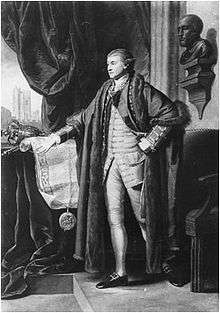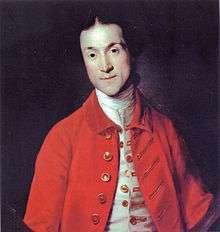Richard Grosvenor, 1st Earl Grosvenor
| The Right Honourable The Earl Grosvenor | |
|---|---|
 Grosvenor, after Benjamin West | |
| Personal details | |
| Born |
18 June 1731 Eaton Hall, Cheshire, England |
| Died | 5 August 1802 (aged 71) |
| Resting place | St Mary's Church, Eccleston, Cheshire, England |
| Nationality | British |
| Political party | Tory |

Richard Grosvenor, 1st Earl Grosvenor (18 June 1731 – 5 August 1802), known as Sir Richard Grosvenor, Bt between 1755 and 1761 and as The Lord Grosvenor between 1761 and 1784, was a British peer, racehorse owner and art collector. He was created Baron Grosvenor in 1761 and in 1784 became both Viscount Belgrave and Earl Grosvenor.
Early life
Richard Grosvenor was born at Eaton Hall, Cheshire, the elder son of Sir Robert Grosvenor, 6th Baronet. He was educated at Oriel College, Oxford, graduating MA in 1751 and DCL in 1754.
Political life
He became Member of Parliament for Chester in 1754 and continued to represent the city until 1761, when he became Baron Grosvenor and was elevated to the House of Lords. He was mayor of Chester in 1759 and in 1769 he paid for the building of the Eastgate in the city. Grosvenor extended his estate by the purchase of the village of Belgrave, and the manor of Eccleston in 1769. He succeeded as 7th baronet on the death of his father in 1755.[1]
Initially, Grosvenor was, like his father, a Tory, but later he came to support the ideas of William Pitt the elder. In 1758 he declared himself in favour of the Pitt-Newcastle coalition and following this he was created Baron Grosvenor in 1761. However, when the Tory Earl of Bute became Prime Minister the following year, Grosvenor changed his allegiance. Then, when Pitt was returned to power in the Chatham Ministry of 1766–68, Grosvenor returned to support him. During the 1770s he supported Lord North during the American War of Independence. He voted against Fox's India Bill in 1783 and was rewarded by William Pitt the Younger with title of Earl Grosvenor the following year.[1]
Personal interests
Otherwise, Grosvenor was interested in the acquisition of art and in horse racing. He was also the principal patron of the satirist and journalist William Gifford. For his art collection he acquired works from Italy, and also bought paintings from Benjamin West (including his painting of The Death of General Wolfe), Thomas Gainsborough, Richard Wilson and George Stubbs. In 1788 a collection of literary pieces composed at Eaton was published as The Eaton Chronicle, or The Salt-Box.[1] Grosvenor was appointed as a Fellow of the Royal Society in 1777.[2] To breed his race horses Grosvenor established studs at Wallasey and at Eaton. His horses won the Derby on three occasions and the Oaks six times.[3]
In the 1760s, Grosvenor occupied Aubrey House, in the Campden Hill area of Holland Park.[4] A London County Council blue plaque commemorates Grosvenor and other residents of the house.[5]
Family
On 19 July 1764 Grosvenor married Henrietta Vernon, daughter of Henry Vernon of Hilton Park, Staffordshire; they had four sons.[1] However the marriage was not happy, and Henrietta had an affair with Henry, Duke of Cumberland, the younger brother of George III. The couple were discovered in flagrante delicto in 1769, which led to Grosvenor bringing an action against the Duke for "criminal conversation" (that is, adultery).[6] He was awarded damages of £10,000, which together with costs, amounted to an award of £13,000 (£1,630,000 in 2015).[7] But Grosvenor was also known to be guilty of adultery himself, regularly seeking out prostitutes around Leicester Square,[8] so he could not sue for divorce. The couple separated and he settled an annual allowance of £1,200 (£150,000 in 2015)[7] on his estranged wife,[1][3] who entered the demi-monde and was a leading member of The New Female Coterie.[9]
Death
Grosvenor died at Earls Court in 1802 and was buried in the family vault at St Mary's Church, Eccleston. His assets amounted to "under £70,000" (£5,640,000 in 2015),[7] but his debts were "over £100,000" (£8,050,000 in 2015).[1][7] He was succeeded at Eaton Hall by his eldest son Robert.[3]
Styles of address
- 1731-1754: Mr Richard Grosvenor
- 1754-1755: Mr Richard Grosvenor MP
- 1755-1761: Sir Richard Grosvenor Bt MP
- 1761-1784: The Right Honourable The Lord Grosvenor [lower-alpha 1]
- 1784-1802: The Right Honourable The Earl Grosvenor
References
- 1 2 3 4 5 6 Farrell, S. M. (2004) (online edition 2008) 'Grosvenor, Richard, first Earl Grosvenor (1731–1802)', Oxford Dictionary of National Biography, Oxford University Press, Retrieved on 10 April 2010. (subscription or UK public library membership required)
- ↑ Library and Archive catalogue, Royal Society, retrieved 25 June 2010
- 1 2 3 Newton, Diana; Lumby, Jonathan, The Grosvenors of Eaton, Eccleston, Cheshire: Jennet Publications, pp. 16–21, ISBN 0-9543379-0-5
- ↑ "Survey of London: volume 37: Northern Kensington". British History Online. Retrieved 1 December 2012.
- ↑ "AUBREY HOUSE". English Heritage. Retrieved 1 December 2012.
- ↑ Stella Tillyard (2010). A Royal Affair: George III and His Troublesome Siblings. Random House. pp. 169–175. ISBN 1-4090-1769-9.
- 1 2 3 4 UK CPI inflation numbers based on data available from Gregory Clark (2016), "The Annual RPI and Average Earnings for Britain, 1209 to Present (New Series)" MeasuringWorth.
- ↑ Law, Susan (March 2015). "Georgian Britain: sex in high places". BBC History Magazine.
- ↑ Rubenhold, Hallie (2008). Lady Worsley's Whim. London: Vintage Books. pp. 176–177.
External links
- Hansard 1803–2005: contributions in Parliament by the Earl Grosvenor
| Parliament of Great Britain | ||
|---|---|---|
| Preceded by Sir Robert Grosvenor Philip Henry Warburton |
Member of Parliament for the City of Chester 1754–1761 With: Sir Robert Grosvenor 1754–1755 Thomas Grosvenor 1755–1761 |
Succeeded by Thomas Grosvenor Richard Wilbraham-Bootle |
| Peerage of Great Britain | ||
| New creation | Earl Grosvenor 1784–1802 |
Succeeded by Robert Grosvenor |
| Baron Grosvenor 1761–1802 | ||
| Baronetage of England | ||
| Preceded by Robert Grosvenor |
Baronet (of Eaton) 1755–1802 |
Succeeded by Robert Grosvenor |